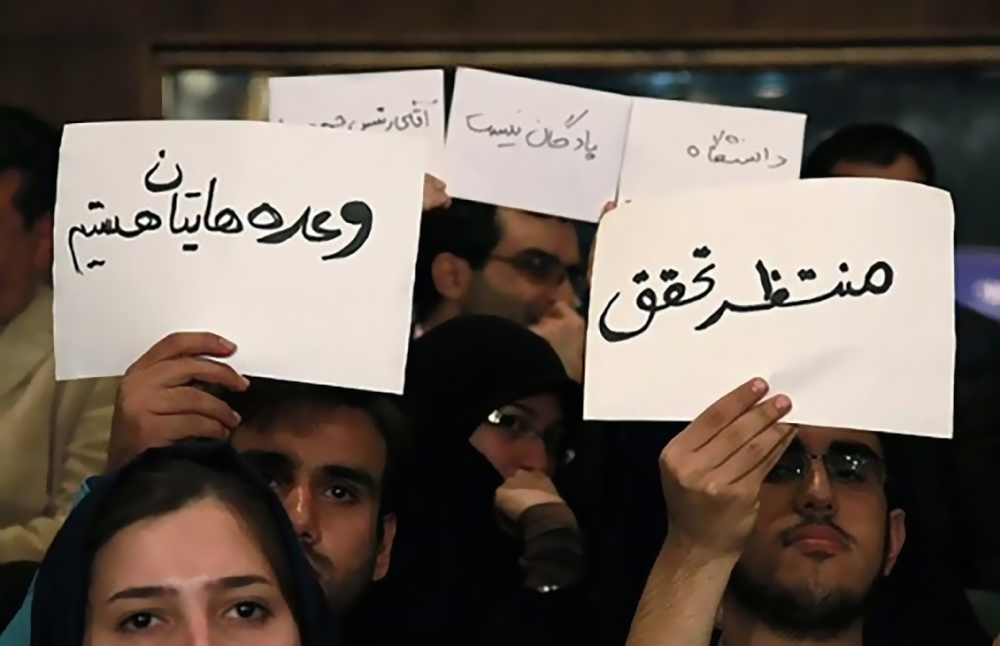Ali Motaheri’s recent remarks about the level of Khamenei’s interest in Mahmoud Ahmadinejad is an interesting and latest example of the extent to which the regime’s top authority is inclined and interested in running the country and making political decisions.
In past years and particularly after people’s protest against 2009 presidential election, many confrontations with political activists were considered as due to resentment of the regime’s leaders and problems of influential people in judiciary system and security organizations with these people. However, this doubt was more brought up in the public opinion and was less officially confirmed.
Now, Ali Motaheri, son of the well-known revolutionary and deputy speaker in the 10th Iranian parliament, talks of anti-constitutional actions of officials of Iran regarding house arrest [of Mousavi and Karroubi], and Khamenei’s “special” interests on the other side of the story [Ahmadinejad].
On the one hand, there is the talk of personal resentment and enmity. As the result of this enmity, the leader of the Republic has confirmed an anti-constitutional measure, as a result of which the people he is furious with are discarded from the political scene.
In an interview with Khabar online website, Ali Motaheri pointed to the unlawfulness of the measure of Supreme Council of National Security regarding the long-time house arrest of the leaders of the Green Movement, saying, “Giving a judicial issue to Supreme Council of National Security to decide and punish is absolutely against the constitution.”
According to Motaheri, “Supreme Council of National Security’s duty is not determining punishment for people or saying somebody must be put under house arrest. Of course, under emergency conditions when there is chaos in the society – and this might happen in other countries as well – the leaders [of movements] might be separated from people close to them to control the rebellion. But when it is controlled, Supreme Council of National Security is no longer responsible, and the rest is the judiciary branch’s responsibility.”
Despite the fact that “uncompromised implementation of the constitutional law” was one of the main slogans of reformist currents that have been after fixing the regime’s structure and the democratic features within the current structure, we have not witnessed any serious measures for preventing actions that, in words of deputy speaker of parliament, are considered as against the constitution in recent years. Because of reformists’ hesitation and passivity against extrajudicial measures that have been approved and justified by the regime’s leader, such measures are no longer exceptions but have become the rule.
» Secret of Ahmadinejad’s decree against imprisonments without sentence
Anger and enmity towards leaders of the Green Movement and the resolve to put them in the condition of gradual death would reveal only one aspect of personal decisions of the leader of the Republic. On the other hand, there is this kind and forgiving look Khamenei has towards some political actors, including Mahmoud Ahmadinejad.
In this regard, Ali Motaheri’s remarks have decoded Mahmoud Ahmadinejad’s reinstatement in Expediency Council despite being disqualified in the presidential election and his tension creating behaviors. Motaheri said, “Of old, the leader had a particular interest in Ahmadinejad, and apparently that interest is still going on. Nothing can be done about kindness and interest, as it is something inward.”
The most familiar sign of personal interest of leader of Iran for Mahmoud Ahmadinejad would certainly go back to his remark on 19 June 2009. At that time, at the peak of a dispute over the election result, Khamenei openly and decisively took the side of Ahmadinejad, saying, “in foreign and domestic affairs, President’s view is closer to mine.”
Even though it was expected that Ahmadinejad’s 11-day sulking in 2011 would put an end to such views, Ali Khamenei continued to support Ahmadinejad to the end of his presidential term. Even disclosure of numerous cases of financial corruption of the 9th and 10th governments did not make the leader give the green light for judiciary confrontation with Ahmadinejad.
After Ahmadinejad registered for the 12th presidential election – despite Khamenei openly forbidding it – it was thought that there would be a complete political reckoning with him the day after the election. But the leader of Iran reinstated him in the Expediency Council to show that he has still preserved his interest in Ahmadinejad.
» Scale based on personal taste

If we put together Motaheri’s remarks about Khamenei’s interests in Ahmadinejad and house arrest of Mousavi and Karroubi, we will get a clear picture about the reason for the kindness with Ahmadinejad and his supporters, despite their economic cases and political unruliness, and constant wrath against the reformism and reformists.
Under such condition, it was expected that Hassan Rouhani could create power balance with his slogans regarding moderation, and would take serious measures to alleviate political tension and break the deadlock of the house arrest of the Green Movement’s leaders. Nevertheless, after 4 years and a half, no practical measure has been taken in this regard, and many of Rouhani’s supporters in the presidential election are now unhappily talking about his unfulfilled promises.
In his inauguration ceremony in 2013, Rouhani pointed out to strong signs of rifts in the political atmosphere, saying, “let us wash the resentments away from the hearts.” During this time, he has reiterated such sentences in his own speeches again and again, but such statements have never resulted in a real change, and the rule of personal tastes is still dominant.
Translated Material: Zaitoun Website
Opinions in this article reflect the writer’s point of view, not necessarily the view of The Arabain GCIS
